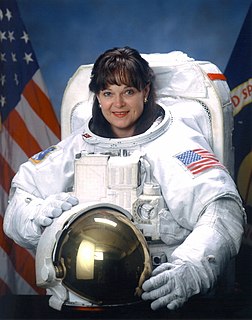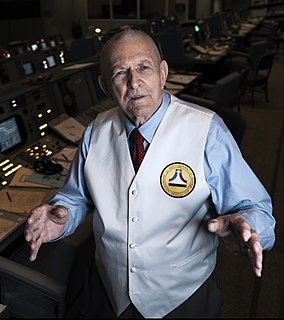A Quote by Leroy Chiao
The space station mission was kind of the culmination of all of my experience of being a NASA Astronaut, so it had brought all of my previous experience into play. I had to learn the Russian language to a fluent level so that I could function as the co-pilot of the Soyuz Spacecraft that we flew up and back from the space station. And then the challenge of being the Commander of the whole expedition, a six and a-half month flight aboard the international space station. I felt the burden of the whole mission on my shoulders, which was fine, and fortunately everything did go well.
Quote Topics
Astronaut
Back
Being
Brought
Burden
Challenge
Commander
Could
Culmination
Did
Everything
Expedition
Experience
Felt
Fine
Flew
Flew Up
Flight
Fluent
Fortunately
Function
Go
Had
Half
International
International Space Station
Kind
Language
Learn
Level
Mission
Month
NASA
Pilot
Play
Previous
Russian
Russian Language
Shoulders
Six
Space
Space Station
Spacecraft
Station
Then
Up
Well
Which
Whole
Related Quotes
We were trying to do as much science as we could because that was the main purpose of the international space station. But without the shuttle to bring up heavy laboratory equipment and bring back samples, we were limited by what we could do, but I was proud that we actually accomplished more science that was planned for the flight. And I got a chance to do two Russian spacewalks on that flight, I had become an expert in U.S. spacewalks and using U.S. suits and techniques, and this was a chance to put on a Russian Orlan suit and do two construction space flights outside of the space station.
I always call myself a space construction worker. We were only the second mission ever to go to the space station. There was nothing on board. We brought the first three tons of equipment, including some of the Imax camera stuff. We literally switched the light on to the station and walked in. It was an assembly mission.
One of the things that makes it so challenging is that we're constructing the Station hundreds of miles above the surface of the Earth and we're doing it one piece at a time For the International Space Station we do not have the privilege of assuming the Space Station is on the ground before we take it up one piece at a time. So we have to be very clever about the testing that we do and the training that we do to make sure that each mission is successful, and that each piece and each mission goes just as it's planned.
For the last several years and culminating in six months in orbit next year, I've been training for my third space flight. This one is almost in a category completely different than the previous two, specifically to live in on the space station for six months, to command a space ship and to fly a new rocket ship.
By 1973, we had a space station, the Skylab, and we had multiple probes going up to planets. So, all this wonderful stuff happened in 10 to 15 years. About that time, there should have been enormous initiatives to make it affordable for people to fly in space, not just a handful of trained NASA astronauts and Russian cosmonauts.
When Russians were having troubles, the Space Shuttle supported the Space Station Mir bringing up much needed supplies and replacements, critical spares, really. That they were able to keep their space station going for much longer than they would have without us. So, I think that shows the value of international cooperation.
In 2009 I went up on the space shuttle. I was in space for 16 days and docked at the space station for 11 days. The entire crew did five space walks, of which I was involved with three of them. When you're doing a space walk, you always have a buddy with you. It's a very dangerous environment when you're doing a space walk.


























